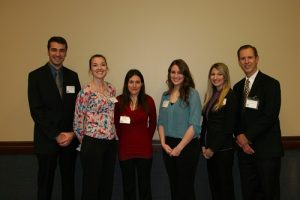
An interprofessional student team comprised of Paria Sanaty Zadeh, DPH-3, Torie Grover, DPH-4, Hillary Kirking, first-year nursing student, Frances Goglio, second-year veterinary medicine student, and Justin Meyers, third-year medical student, was awarded first place at the statewide Interprofessional Healthcare Case Competition organized by Wisconsin Area Health Education Centers (AHEC). Joe Zorek, assistant professor (CHS) in the Pharmacy Practice Division and the School of Pharmacy’s Interprofessional Education Liaison, served as the team’s faculty mentor.
Wisconsin AHEC is part of a nationwide AHEC network devoted to providing educational opportunities to health professions students, and improving the accessibility and quality of primary health care in Wisconsin. As a health education and outreach program, Wisconsin AHEC opens the annual competition to students from any Wisconsin university. Participants form groups of four to five students from any health professions program, with at least three professions represented in each team. Teams were given two months to collaborate on a complex health-systems case study and develop a multi-component proposal. The proposal criteria included detailed recommendations for the targeted health-system to improve the care and health outcomes of its patients.
Teams who developed the highest-quality proposals were selected to present their findings and recommendations to an interprofessional panel of healthcare experts serving as competition judges. This year’s competition took place on January 7 and 8, 2016 in Wisconsin Dells, Wis., where the winning team was announced. The UW-Madison team competed against eight finalist teams chosen from 18 teams that applied. The judges represented leaders from Wisconsin’s various fields of healthcare academia and practice. They included Roger Rego; Stephanie Stewart Ph.D., R.N.; Kathy Loppnow Ph.D., R.N., Dr. Richard Dart, M.D., and Trevor Cooper.
In the months prior to the event, students spent several months developing their plan, which included interventions such as:
- A primary prevention program for the general population to receive incentives for making healthy living choices.
- A preventive case management program for high-risk patients who are smokers with hypertension.
- An optimized inpatient stroke treatment program with stroke coordinators overseeing care for patients post-stroke and managing follow-up appointments with various healthcare professionals.
- Innovative payment models with incentives for health network savings for privately and publicly insured members while reducing network financial risk.
The competition provided an important opportunity to engage in interprofessional collaboration, which is an essential component of the future of healthcare. Pharmacy students learned about, from, and with other health professions students to function as a cohesive healthcare team. Team members agreed that the interprofessional teamwork experience was highly enriching as part of their education toward becoming healthcare providers. Through their experience, team members believe they gained critical knowledge, skills, and attitudes essential for enabling an interprofessional, patient-centered practice.